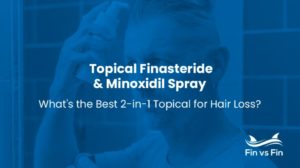In general, hair grows about half an inch per month, or six inches per year. This means that some individuals may experience differing hair growth rates on a monthly or yearly basis depending on several factors, including age, genetics, lifestyle, and more. These unique characteristics can also influence the thickness of the hair, as well as the effectiveness of certain hair growth or thickening treatments.
While there may be some factors you can’t control, there are several ways you can speed up hair growth and increase thickness, while also improving the hair and scalp’s overall health. These include prescription treatments, over-the-counter (OTC) methods, and natural ways that focus on scalp health and nutrition.
In this article, we discuss how fast hair grows in the context of the hair growth cycle and its phases. In addition, we cover ways you can actually speed up hair growth using prescription, over-the-counter (OTC), and natural methods.
Can hair grow 1 inch in a month?
On average, hair grows about half an inch every month, however, some individuals may experience faster hair growth.
How Fast Does Hair Grow During Each Phase of the Hair Cycle?
Hair doesn’t just grow and fall out. There is actually an entire lifecycle that your hair follicles go through to create new strands, grow them to a specific length, and then shed them before starting the entire process over again.
There are four stages of the hair growth cycle:
Anagen is the growth, or active, phase in which your hair grows about half an inch every 30 days. The length of the hair growth and duration of the anagen phase differs for every individual, but can range from three to 10 years.
Up to 90% of the hair on your head is in the anagen phase. However, even if most of your hair is actively growing, every person has a maximum length their hair can reach, called their terminal length.
Catagen, the transitional phase that lasts for a few weeks, describes when the hair is preparing to stop growing and is cut off from the blood supply. In addition, the hair follicles begin to shrink and hair appears thinner. About 3% of hair on the head is in this period at any given time.
Telogen, the resting phase that lasts for three to four months, describes when the hair is neither growing nor shedding, and new hairs are starting to form in the follicles that released hair during the previous phase. Anywhere from 10% to 15% of your hair is in the telogen phase at any given time.
Telogen effluvium describes a hair loss condition that impacts hair during the telogen phase. Caused by a stressor, illness, major surgery, certain medications, and more, this condition causes up to 70% of scalp hairs to shed around two months after the trigger. In some cases, no treatment is needed, but, in others, it may point to an underlying condition that requires treatment.
Exogen, the shedding phase, describes when the hair falls out at a rate of 50 to 150 strands per day over a period of two to four months. The hair loss will occur naturally, but you may notice it most when you’re washing or brushing your hair.
The time between the telogen phase and exogen phase plays an important role in the hair cycle, as it creates new opportunities for your body to grow more hair and let healthy strands replace old ones.
Some hair treatments encourage the hair cycle to transition from the telogen phase to the anagen, or growth phase, to promote hair growth and reduce shedding
What Factors Affect Hair Growth Rate?
The most common factors known to affect hair growth are:
- Age and assigned sex, specifically, assigned males 30 and older tend to see more hair changes, like thinning and hair loss, more often than assigned females
- Overall health, which may include nutrient deficiency (lacking biotin, iron, zinc, or protein) or health conditions
- Genetics, which can impact hair length, texture, and thickness, as well as how fast it grows
- Certain medications and treatments, such as chemotherapy or radiation
- Stressors, such as childbirth, illness, surgery, or major life changes like divorce
- Hair treatments that can cause damage, such as coloring or straightening the hair
Hair Growth Rate By Age
Before the age of 30, children and adults can expect a hair growth rate of around half an inch every month. After the age of 30, this growth slows down and hair may begin thinning. Some individuals, especially assigned males, may notice signs of significant hair loss around this time, with many losing most of their hair by the time they reach 60 years old.
How to Speed Up Hair Growth
There are many treatments available that can help speed up hair growth, as well as thicken hair, including prescription, OTC, and natural methods. Before trying any new medication or supplement, it’s best to speak with your healthcare provider to ensure that it is safe for you to use.
Related reading: 14 Ways to Get Thicker Hair
Prescription Treatments
Prescription treatments include finasteride, an FDA-approved oral treatment for hair loss, as well as dutasteride, a medication that is used to treat enlarged prostates that is sometimes prescribed off-label for hair loss treatment.
Finasteride and dutasteride may also be available as topical, prescription treatments.
Finasteride
Finasteride is a prescription medication that is shown to be effective in treating male pattern hair loss, also called androgenic alopecia. It works by inhibiting an enzyme called 5-alpha reductase, which converts testosterone into DHT. DHT plays a role in shortening the growth phase of hair and shrinking hair follicles.
Ultimately, this medication helps reverse the shrinkage of hair follicles, increases hair density and growth, and helps slow down hair loss. It usually takes a few months to a year to see results from finasteride.
Related reading: Finoxidil- What It Is, How It Works, and Where to Get It Safely
Dutasteride
Dutasteride and finasteride act in the same way by inhibiting the enzyme 5-alpha reductase, which causes the body to convert testosterone into DHT. The key difference between these drugs is that dutasteride targets both type 1 and 2 of the enzyme, and finasteride specifically targets type 2, potentially making dutasteride a more effective treatment for certain individuals.
Dutasteride may lead to increased hair growth within three to six months after starting treatment.
Related reading: XYON Dutasteride Review- Is It Worth It?
Over-the-Counter Hair Loss Treatments
OTC hair loss treatments may include minoxidil, an FDA-approved topical treatment, as well as laser caps, an FDA-cleared option with proven effectiveness for some individuals.
Minoxidil
Minoxidil is a topical hair loss medication that is applied directly to the scalp and can be used by assigned males and assigned females. It works by increasing blood flow to the scalp and lengthening the anagen, or growth, phase of the hair cycle, which may stimulate hair growth and help reduce shedding.
Outcomes for minoxidil vary, but many people generally see results within two to four months after starting treatment. The most noticeable results of minoxidil are apparent after a full year of using the medication.
Related reading:
- Rogaine vs. Minoxidil – What’s the Difference?
- Lipogaine vs Rogaine – What’s the Best Minoxidil Brand?
Laser Caps
A hair laser cap uses low-level laser therapy (LLLT) to stimulate hair growth in a non-invasive and pain-free way. Using light energy at specific wavelengths, the laser cap stimulates the scalp and hair follicles to help promote circulation and blood flow, while reducing scalp inflammation.
Research shows that regular use of a laser cap for hair loss can increase hair growth within three to six months, with an effectiveness similar to minoxidil.
Proper Nutrition
Lack of proper nutrition, especially a deficiency in certain vitamins and minerals, has been linked to hair loss conditions and can impact hair growth, hair and scalp health, as well as hair thickness.
Hair Supplements
In some cases, nutrient deficiencies can lead to poor hair growth or shedding.
Over-the-counter (OTC) hair loss supplements typically use biotin, B vitamins, and vitamin D, along with minerals like iron and zinc, to target underlying nutritional deficiencies. Some may also use plant extracts, like green tea and saw palmetto, to treat hair loss.
All of these ingredients work in different ways to support healthy hair and growth. Vitamins and minerals, for example, help give your hair follicles the nutrients they need to grow hair. Extracts, like saw palmetto, may help block DHT and have been shown to be effective in increasing hair count, as well as density.
Food That Makes Hair Grow Faster
Nutrition can significantly impact hair growth and overall scalp and hair health. Specifically, research suggests consuming foods that contain tocotrienol and alpha-tocopherol, two groups of vitamin E, may lead to significantly better hair counts in certain individuals. In addition, unsaturated fatty acids, vitamin D3, and zinc have also shown a direct relationship to hair growth.
Foods that contain some of these nutrients include wheat, barley, soybeans, coconut oil, sunflower seeds, almonds, and pine nuts.
Related reading: Compare The Best Online Organic Markets
Natural Ways to Boost Hair Growth
Scalp Massage
Research suggests that giving yourself a scalp massage for a few minutes every day may lead to improved blood circulation, which may promote increased hair thickness and hair growth.
Reduce Stress
High levels of stress are associated with hair loss and scalp dryness. Managing stress through various techniques, such as yoga or breathing exercises, can help you reduce stress and promote hair and scalp health. Keep in mind that scalp health is directly tied to hair growth and overall hair thickness.
Related reading: Calm vs. Headspace vs. Breathe – Which Meditation App Works Best?
Prioritize Scalp and Hair Health
Limiting the use of heat styling and certain hair treatments, like coloring, as well as checking your hair care products’ ingredients can help you prioritize your hair and scalp’s overall health, which may help support hair growth. Specifically, avoiding products with fragrance, phthalates, ethanol, and isopropyl alcohol can help you keep your hair and scalp healthy, as these products can be damaging and very drying.
In addition, using a gentle, thickening shampoo and conditioner that contain ingredients, such as caffeine and saw palmetto, may help increase hair thickness and promote hair growth.
Treatments for Speeding Up Hair Growth in Assigned Males
We’ve included our top picks for hair treatments for assigned males who want to boost their hair growth.
Best Treatments for Speeding Up Hair Growth for Men | Recommended Treatments | Website | |
|---|---|---|---|
| Hims |  | - 2-in-1 Topical finasteride + minoxidil | |
| Keeps |  | - 2-in-1 Topical finasteride + minoxidil | |
| Happy Head |  | - Topical finasteride | |
| Ro |  | - Topical minoxidil | |
| XYON |  | - Topical finasteride | |
| Strut Health |  | -Topical finasteride | |
| iRestore |  | - Laser Cap | |
| Capillus |  | - Laser Cap | |
| Theradome |  | - Laser Cap | |
| Nutrafol |  | Hair supplements: | |
Related reading:
- Hims vs. Roman vs. Keeps – Which Hair Loss Subscription Is Best?
- Hims vs. Nutrafol vs. Keeps – Which Works Best for Hair loss?
Treatments for Speeding Up Hair Growth in Assigned Females
We’ve rounded up the best treatments for assigned females who want to encourage faster hair growth.
The Verdict: Can You Force Hair to Grow Faster?
Prescription, OTC, and several natural methods may help some indivuduals grow hair at a faster rate. | |
Prescription medications, such as finasteride and dutasteride, OTC options, like minoxidil and laser caps, as well as natural methods, like proper nutrition, hair supplements, and more may help certain individuals increase hair growth and overall hair quality.
It’s important to reach out to your healthcare provider prior to trying any new treatment to ensure it is appropriate for you to use. | |
Frequently Asked Questions (FAQs)
What makes hair grow fast or slow?
Genetics, age, overall health, certain medications, and stress may impact your hair growth rate, as well as thickness.
Does hair grow 2 inches in a month?
The average person’s hair grows about half an inch per month, but some people may have more rapid hair growth than others.
Related reading: Finasteride Results- How Effective Is It?
What causes hair to grow faster than normal?
Health conditions, medications, stress, and scalp health may impact the rate at which hair grows. For example, managing stress may help promote hair growth.
How fast does hair grow in a week?
Hair grows about .125 inches in a week on average.
How long does it take to grow 2 inches of hair?
On average, it can take about 4 months to grow 2 inches of hair, as many people experience hair growth at a rate of about half an inch per month.
Learn More About Hair Loss

Topical Finasteride and Minoxidil Spray Review – What’s the Best 2-in-1 Topical for Hair Loss?
If you’ve been looking into treatment for pattern hair loss (androgenic alopecia), you may have come across the ingredients minoxidil and finasteride, which are the two most popular and clinically-backed treatments for thinning hair that come in both oral and topical form. Brands like Hims,

Tretinoin and Hair Loss: Does It Help Regrow Hair?
Key Takeaways Topical tretinoin may support hair growth by increasing circulation to the scalp and boosting cell turnover. Up-to-date clinical research indicates that tretinoin can enhance the effects of minoxidil for hair growth. The most common side effects of tretinoin are skin irritation, dryness, and

Red Light Therapy for Hair Loss: Does It Promote ReGrowth?
Key Takeaways Red light therapy can safely and effectively treat hair loss in some individuals. It typically takes four to six months to see results from red light therapy. Red light therapy can promote regrowth and hair retention. While many types of red light therapy

How to Get Oral Minoxidil Online: A Complete Guide
Key Takeaways Oral minoxidil is a good option for individuals with androgenic alopecia who experience side effects from topical minoxidil or who are not seeing the results they hoped for. You can get an oral minoxidil prescription online by completing a virtual consultation with a

Does High Blood Pressure Cause Hair Loss?
Key Takeaways While some studies do show a potential association between high blood pressure and hair loss, more research is still needed. High blood pressure can affect blood flow, potentially impacting blood flow to the scalp and hair follicles. Some medications used to treat high

Dense Hair Experts Review: What Do They Offer for Men’s Hair Loss?
Dense Hair Experts Overview Price: £59.99 (or £47.99 on subscription) Prescription products: Finasteride, dutasteride OTC products: Minoxidil, shampoo, conditioner, vitamins, styling products Active ingredients: Finasteride, dutasteride, minoxidil Potential side effects: Itching, redness, flaking Who it’s best for: Individuals experiencing male pattern baldness Go to Site→



















